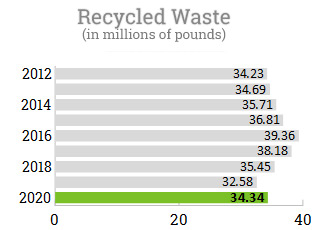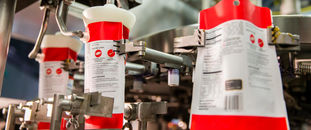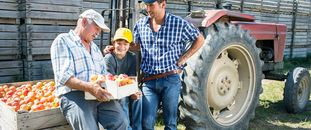Sustainability
Seneca is dedicated to responsible practices across the board, from recycling and lowering our carbon footprint to efficiently using energy resources, conserving water, optimizing packaging and practicing responsible integrated pest management.
Full Commitment to Recycling
Seneca is committed to finding ways to process used materials into new products which allow us to prevent waste of useful materials, reduce consumption of fresh raw materials, reduce energy usage and decrease air and water pollution. We have several programs that reduce the waste delivered to landfills through packaging optimization and plant recycling programs.
Our offices are equipped with separate containers used only for recyclable materials and each plant has a comprehensive recycling program to track items that are recycled so that we can identify areas needing improvement.
In cooperation with RIT (Rochester Institute of Technology), we obtained a grant to install recycling equipment at our Geneva, NY facility during the latter part of our fiscal 2020 year. Since installation, we have been able to improve our landfill avoidance in the Geneva plant by more than 50% on a month by month basis.

Reusing or Repurposing By-Products
- We reuse over 600,000 lbs of by-products annually for animal feed, composting material, and soil amenities. Our largest sweet corn plant produces an excess 70,000 tons of silage, and 100% of this is reused as animal feed or soil amenities.
- Seneca’s seed and agriculture operations partners with IBAC Interests, L.P., a company that specializes in the repair and recycling of our large seed bags. With a united effort, over 176,000 lbs of bagging material have been kept out of landfills since 2011.
- In 2016, we entered into an agreement with Pratt Industries where we supply fibrous by-products from food processing, and they supply us with 100% recycled fiber products for packaging our finished goods. During 2020, 24 million fiber trays and 5 million cartons were used, up from 15.5 million total pieces in 2019.
- 98% of our waste water - one billion gallons - is reused for irrigating animal feed crops.
- After years of experimentation and modifications, our closed loop by-product digestor in Montgomery, MN returns methane to power our boilers, which has reduced our reliance on natural gas by about 20%.
- We have entered into an agreement with the City of Janesville to send wastewater to a digester lagoon which produces methane, which in turn, is sent back the Janesville plant to be burned in a dual burning boiler. This has reduced our reliance on natural gas by 15% in the Janesville plant.
Energy Efficiency
From the farm to the table, energy affects every aspect of our business. Seneca has completed the following towards reducing and conserving energy:
- Installation of boiler economizers, heat exchangers, blow-down heat exchanges, condensate recovery systems, and reverse osmosis units where feasible to reduce boiler blow down (these units lower natural gas consumption).
- Variable frequency drives on blowers and pumps are used.
- Energy efficient lighting with occupancy sensors are installed in our warehouses.
- Electric forklifts have been purchased to decrease the use of propane and lower greenhouse gas emissions.
- Programs are in place to reduce equipment usage during peak hours to reduce our overall peak energy use in freezer plants.
- We use sensors to monitor equipment runtimes and automatically turn off machines if not needed.
- Eliminated tractor trailer idling during down time due to APU (auxiliary power unit) installations.
- Policies are in place at all warehouses requiring non-idling of tractors when being loaded or unloaded.
- Our data center has undergone major upgrades to reduce energy usage and cooling costs.
- We have saved over 22,000 gallons of diesel fuel by installing solar powered aerators at our facility in Glencoe, MN.


